Savannah Cat
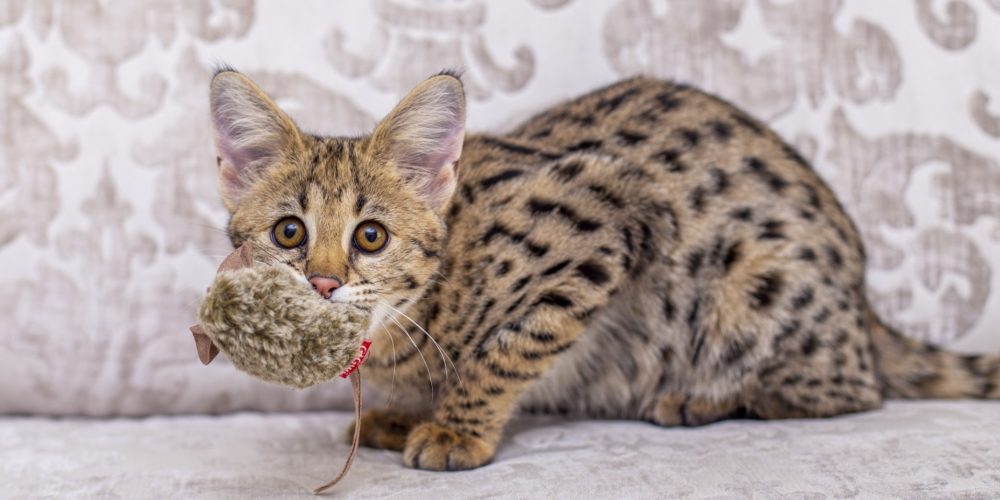
F1, F2, F3, F4 and F5 Savannah Cats
Overview of Savannah Cats
The Savannah cat, which is the largest type of cat, is a highly coveted and exotic breed. It is renowned for its African roots, given that it is half African Serval and half domestic cat. Naturally, this mixture gives the Savannah cat a stunningly beautiful and unique appearance.
The Savannah has a ringed or spotted coat with variations of black, brown, and silver throughout. It also has short, glossy fur that adds to the sleek appearance of the cat. Its tall, lean body, large eyes, and enormous ears add to its exotic feel. It also has longer than average extremities.
Savannah Breed Facts
- When it comes to the Savannah Cat lifespan, indoor cats tend to live longer. The average Savannah cat enjoys a long life that can last up to 20 years.
- Depending upon how close the cat is genetically to its African ancestor, the Serval, Savannah cats can go for upwards of $15,000.
- It is important for prospective buyers to ensure that their state allows for ownership of Savannah cats. States like Georgia and Massachusetts have made owning a Savannah cat illegal due to its hybrid nature.
- Due to its large appearance, many assume Savannahs are much heavier than they actually are.
- Savannahs are incredible jumpers and can jump up to 8 feet in the air.
Savannah Size Ranges
As the largest domesticated cat breed, the size and genetic makeup of a Savannah is classified as either F1, F2, F3, F4, or F5. The “F” stands for “filial generation.” By this term, a prospective Savannah buyer can determine how closely or how distantly the cat is to its African Serval heritage.
The Savannah cat size compared to a domestic cat is significant. The average height for a domestic cat is around 9 to 10 inches, but for the Savannah it can be between 11 and 22 inches tall.
 F1 and F2
F1 and F2
A Savannah that is classified as “F1” has one parent that is 100% Serval and another parent that is a 100% domestic cat. This type of Savannah is tallest, with some males being up to 18 inches tall at the shoulder. In terms of length, they can be between 20 and 22 inches. Savannah’s of the F1 type can reach weights of 25 pounds or more.
An F2 Savannah is only 25% Serval. Besides the fact it is a bit shorter than the F1 Savannah, they are essentially the same.
These types look very much like their Serval parents or grandparents with tear markings below its eyes and ocelli around its ears.
These are the most sought-after, expensive type of the Savannah breed.
F3, F4, and F5
The F3, F4, and F5 classifications of Savannah range from 20% to 10% Serval genetically. As the Savannah gets further away from its African heritage, the more it will resemble a domestic cat in height, weight, and appearance. For instance, the F5 Savannah is usually 11 inches tall or less. This is quite a jump from the nearly 22 inches of the F1.
As the Savannah gets further away from its exotic lineage, the more inexpensive they become.
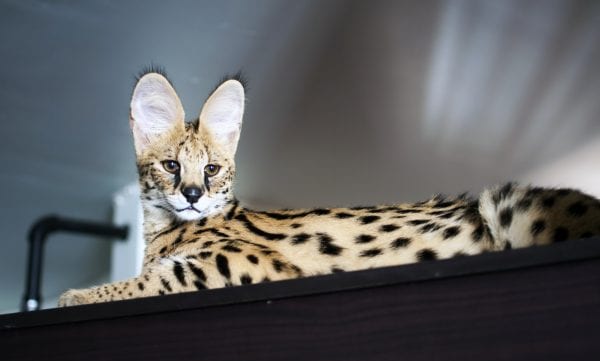
Savannah Cat Personality
The Savannah behavior and personality traits can vary. Those Savannahs that possess F1 or F2 status tend to have streaks of aggressiveness and can be on the territorial side. Many come off as standoffish. This comes from their direct relation to their wild ancestors, no doubt.
However, the F3 through F5 types of this breed resemble more and more of their domestic side. Savannahs are known for being extremely intelligent cats, thanks to their ancestors that braved the remote savannas of Africa.
These cats also love playing, going on adventures, and are attracted to water.
They can make great family pets, but owners should beware that they do tend to hunt, like their wild ancestors. Because of this, small dogs, cats, and other animals may be an object of prey.
Many Savannahs have high energy levels, so activities and puzzles that engage their mind are important to utilize. They resemble canines, in that, learning tricks and being trained is something they excel in and enjoy. Training can be a great, fun bonding time with a Savannah cat.
Even more, this breed flourishes if given other furry playmates to go on adventures with.
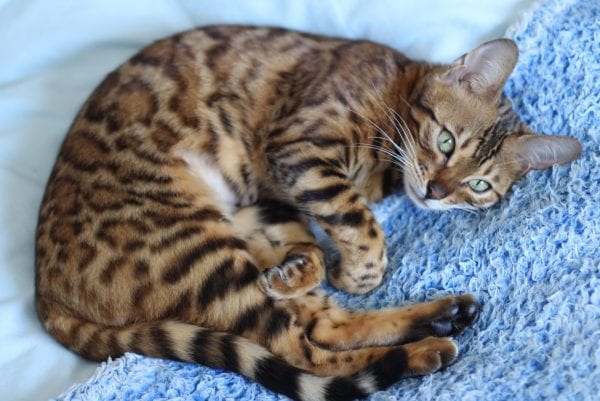 Caring for Your Savannah Cat
Caring for Your Savannah Cat
Grooming
When it comes to grooming, this breed requires the minimum. Their short hair does not shed often, so little brushing is needed. M any Savannah owners give the cats weekly baths to freshen up their coat and simply because this breed loves being in water.
Feeding
Savannah cats should be fed dry and wet food of premium quality. Various meats like chicken can be fed to this breed, given the nutrients and high levels of protein that meat contains. Adequate water should be left around for the energetic Savannahs.
Training
Litterbox training is essential at an early age for cats. Socialization training may be needed for this breed since some of the F1 or F2 Savannahs can be distant at first.
Hereditary Health Issues
For the Savannah cat breed, there are almost no occurrences of hereditary diseases that are known to affect this breed. Like any cat, the Savannah is subject to infections and viruses and should be vaccinated as kittens. Besides this, however, there are hardly any significant health conditions that frequent this breed.
Hypertrophic Cardiomyopathy
Due to their hybrid nature, Savannahs are susceptible to conditions that commonly affect hybrid breeds. Cardiomyopathy is one of them. This condition includes the muscles of the heart growing in thickness. Lethargy and rapid breathing usually accompany this condition.
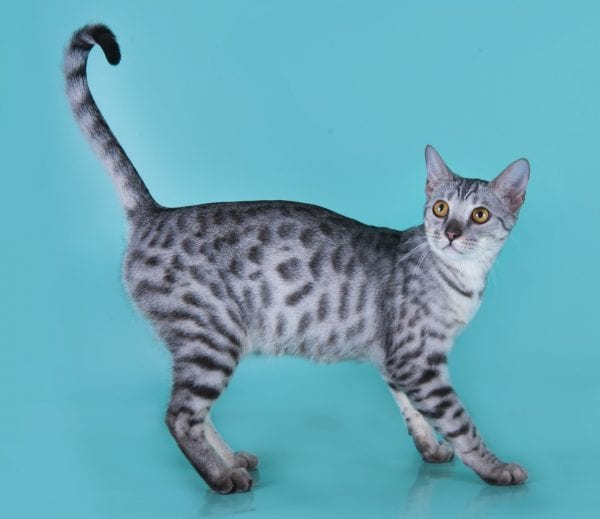 Early Screenings
Early Screenings
Often, a Savannah will be purchased from a breeder that should be certified. It is important to ensure that the Savannah was bred with healthy cats that have no known genetic diseases. It is highly recommended that Savannahs be subjected to health screenings as kittens to make sure that no unforeseen problems arise.
Besides this, Savannahs are generally an exceedingly healthy breed. As mentioned before, this breed boasts of a long life that can last up to 20 years.
If any questions or concerns about a Savannah come up, vet care should be sought from a vet with sufficient knowledge about the well-being of Savannah cats.
Bengal Cats
A lot of people confuse the Savannah’s with the Bengal cat breed, and they are different.
Facebook Savannah Adoption Page
MeowWiki recommends Savannah cat lovers connect with this Savannah Rescue and Adoption page on Facebook.
MeowWiki’s Commitment to Cat Lovers, Rescues and Shelters
Our mission is to help cat owners as well as their favorite rescue and shelters by offering animal shelter, rescue and charity donations through our latest giveaways.




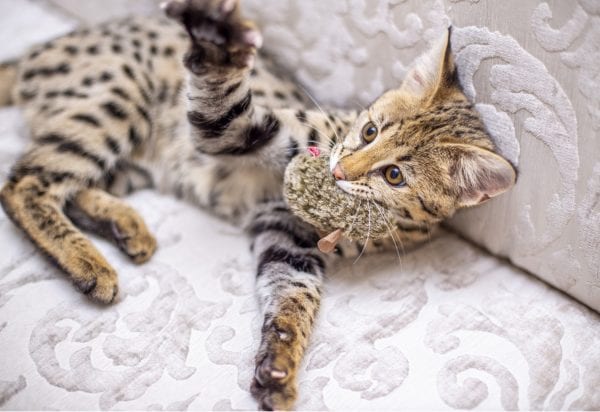 F1 and F2
F1 and F2